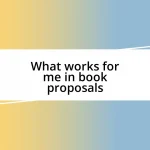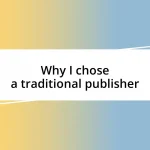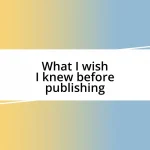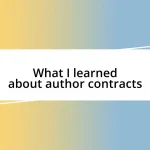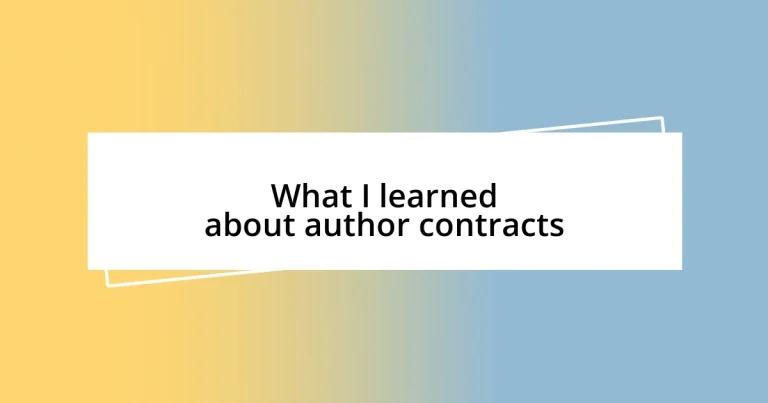Key takeaways:
- Understanding royalties, rights, and ownership is crucial to navigate author contracts effectively, as they directly impact an author’s financial planning and creative control.
- Negotiating contract terms with confidence and clarity can lead to better outcomes, emphasizing the importance of knowing your priorities and being open to creative solutions.
- Seeking legal advice is essential, as it empowers authors by highlighting critical details and potential pitfalls that may be overlooked, ensuring more favorable contract conditions.
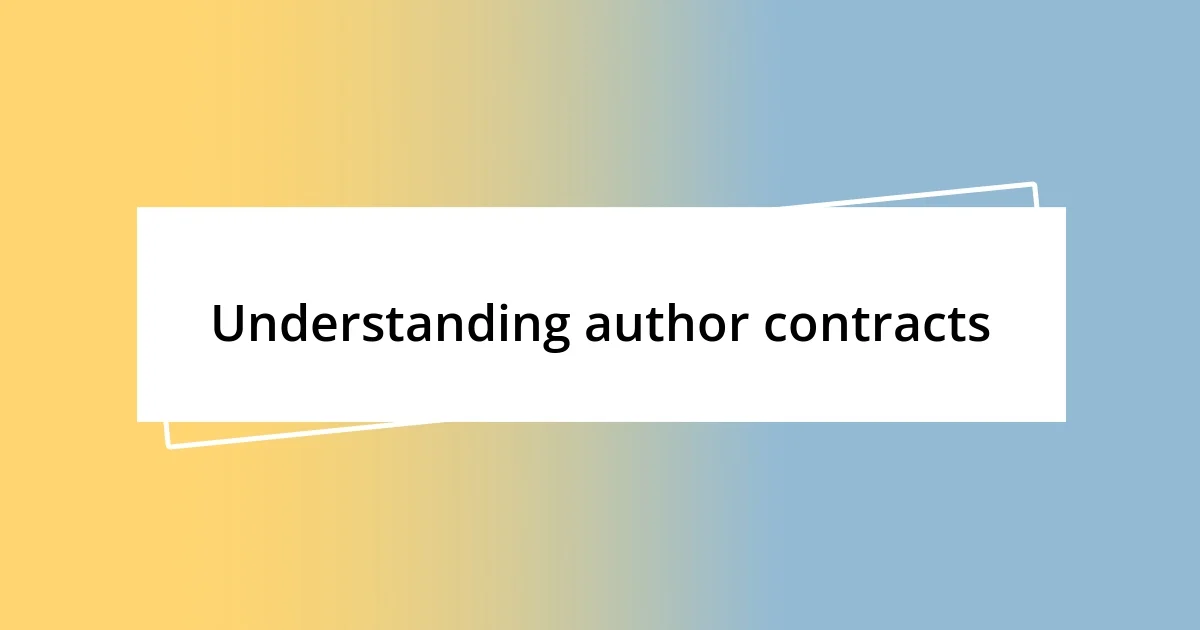
Understanding author contracts
When I first ventured into the world of author contracts, I was overwhelmed by the legal jargon. I remember sitting at my desk, pouring over clauses and feeling lost. Have you ever felt that way when navigating something new and complex? Understanding the language is crucial because every term can significantly alter your rights and responsibilities as an author.
One key aspect I quickly realized is the importance of royalties. Initially, I saw a percentage and assumed it was favorable, but then I learned to read the fine print. What about advances or the different types of royalties—net versus gross? The emotional rollercoaster of excitement mixed with apprehension was hard to navigate. Knowing exactly what you’ll earn is essential for your financial planning.
Another enlightening moment came when I understood the significance of rights. I vividly recall the moment I learned about subsidiary rights and how they could lead to additional income streams. Have you considered what happens with your work after the initial publication? The thought of your book being adapted into a film or translated into another language can be thrilling. Grasping the nuances of these rights helps you become a more empowered author, ready to make informed decisions.
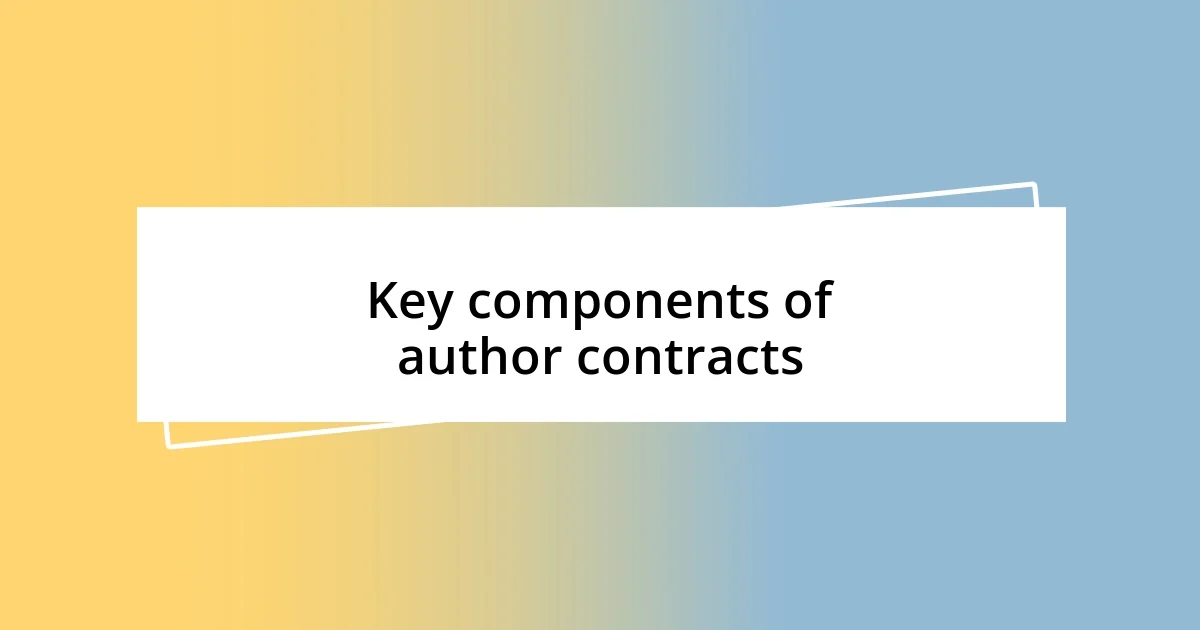
Key components of author contracts
The first key component of author contracts that I’ve encountered is the advance payment. It’s not just money upfront; it shapes your financial expectations and overall experience. I remember the first time I received an advance—it felt like validation of my work. But it also came with pressure; if my book didn’t earn out that advance through royalties, I’d need to consider the implications for future projects. Have you thought about how an advance might influence your motivation or decision-making?
Next, I found that publishing rights are another critical piece of the puzzle. The various rights—like print, digital, audio, and foreign—can have a significant impact on how widely your work is distributed. There was a moment during a negotiation when the agent explained to me how retaining certain rights could lead to unexpected revenue streams. I hadn’t realized that each right could open doors for adaptations or translations. It’s empowering to know that these aspects are negotiable, and that being informed can greatly impact your author journey.
Lastly, the contract often includes specific termination clauses. I learned this the hard way when one of my projects didn’t go as planned. The ability to exit a contract if terms aren’t being met is vital for authors. It protects your creative efforts while giving you the opportunity to pursue new avenues. Reflecting on this, it became clear to me that clarity in these terms helps ensure that your artistic vision isn’t stifled by contractual obligations.
| Component | Description |
|---|---|
| Advance Payment | Initial payment to the author that affects future royalties and financial expectations. |
| Publishing Rights | Includes rights to print, digital, audio, and foreign markets; determines distribution and potential revenue. |
| Termination Clause | Conditions under which the author can end the contract, ensuring creative freedom. |
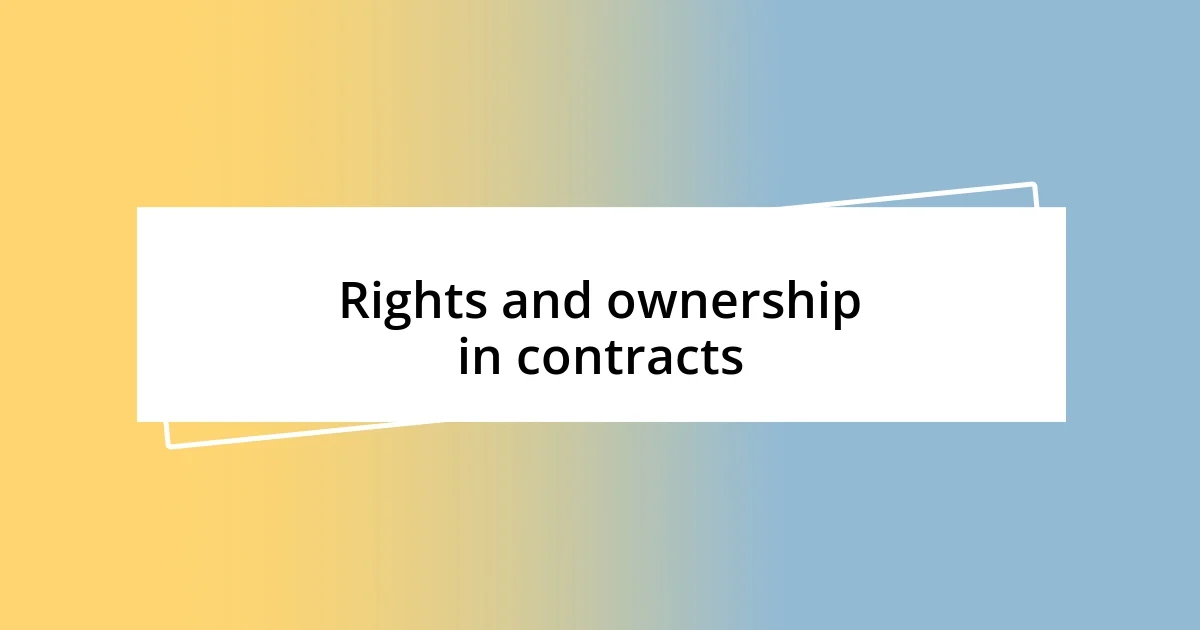
Rights and ownership in contracts
While examining the rights and ownership outlined in author contracts, I quickly learned how essential it is to understand what you truly own. I vividly remember a conversation with my mentor, who emphasized, “Ownership isn’t just about the book you write; it’s about every format it may take.” This resonated deeply with me, as I hadn’t considered how film adaptations or foreign language translations could have such profound implications for my future earnings. It’s a reality check that I believe every author should embrace early on.
Here are some critical aspects of rights and ownership to consider:
- Copyright Ownership: Typically, as the author, you retain copyright to your work, but some contracts may transfer or share these rights. Ensure you know what’s being offered.
- Subsidiary Rights: These rights include adaptations, translations, and merchandising. I once missed out on potential revenue from a translation deal because my contract only mentioned print rights.
- Renewal Terms: Pay attention to how long the publisher has your rights. I learned this the hard way; my first book was bound for longer than I’d preferred, limiting my ability to publish new works in the interim.
- Exclusivity Clauses: Some contracts initially made me uneasy, restricting my ability to publish elsewhere. Understanding these can impact your other projects.
- Future Rights: Be aware of what happens to your rights if you decide to expand your oeuvre. I had a situation where I was uncertain if I could write a sequel without first negotiating with my publisher.
Reflecting on these terms can bring clarity to your ownership over your creative work. I’m often reminded that understanding rights isn’t just about the current contract; it’s about securing your future as an author.
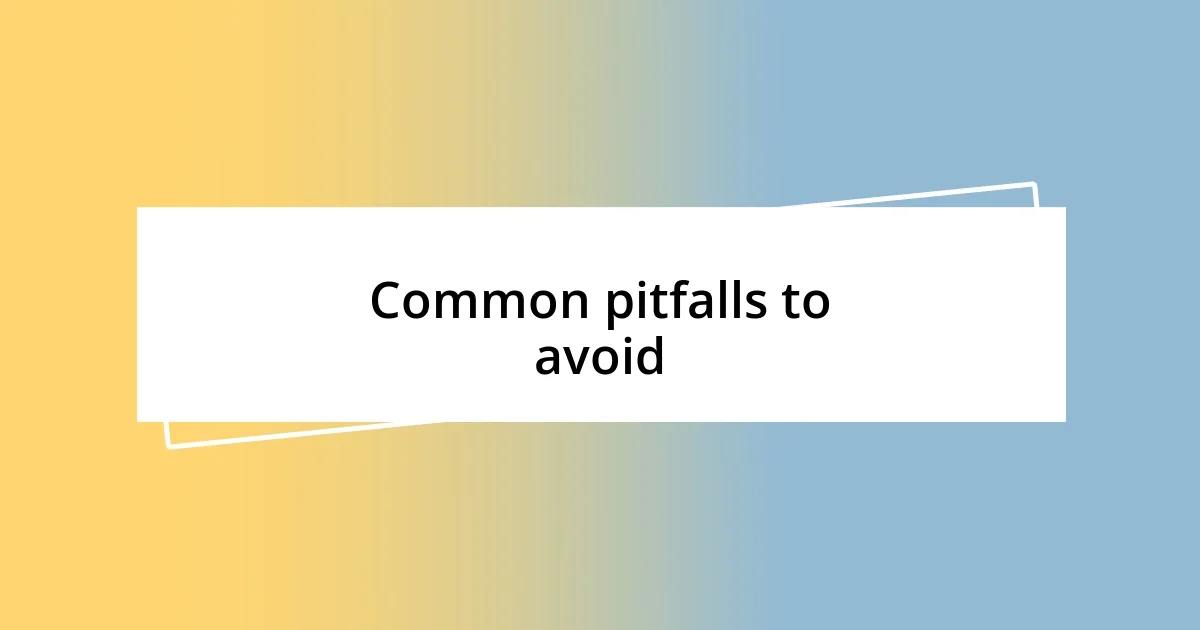
Common pitfalls to avoid
Navigating the complexities of author contracts can be daunting, and overlooking details can lead to significant pitfalls. One major trap I discovered is the failure to clarify the scope of rights being granted. I remember signing a contract without fully understanding that I was relinquishing the rights for foreign translations. When I found out my work could be adapted into multiple languages without my input, it felt like a missed opportunity. Have you ever felt that sinking feeling that you could have benefited from a deeper understanding of your own work?
Another pitfall is the ambiguity in payment structures. Early in my writing career, I signed a contract that seemed favorable at first glance, but the royalty percentages were vague. It wasn’t until I received my first statement that I realized the terms were far less lucrative than I had anticipated. It’s crucial to dissect each payment clause so you aren’t left guessing how much you’ll actually earn. I often ask myself: how clear are these terms when you first review them?
Lastly, many authors overlook the negotiation process itself. I made this mistake during my first contract discussions, feeling unprepared and anxious to just get the deal done. But I learned that negotiation isn’t just about getting your way—it’s about advocating for a future where your voice remains strong. Remember, this agreement is a professional relationship, and if you don’t speak up, who will? Developing confidence in advocating for your rights can save you from regret later on.
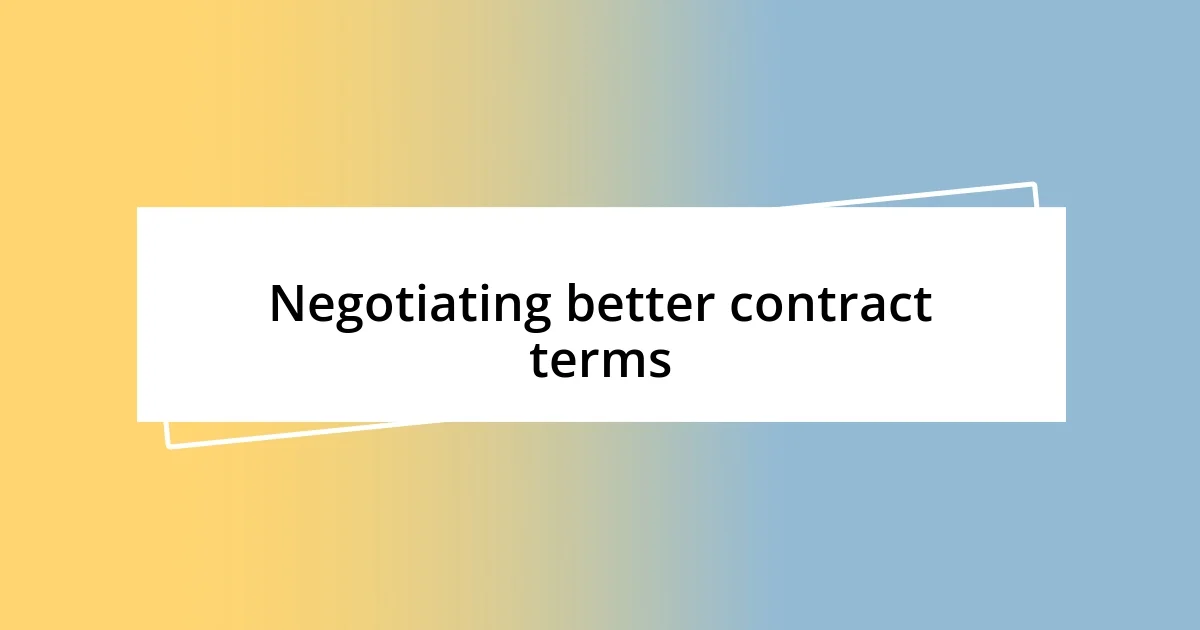
Negotiating better contract terms
One of the strongest tools in negotiating better contract terms is to approach the conversation with confidence and knowledge. I recall my first attempt to negotiate an advance with a publisher; I walked into the meeting feeling nervous and unsure of my worth. But when I armed myself with industry standards and comparable author advances, it empowered me to ask for what I truly believed I deserved. Have you ever felt the difference between negotiating from strength versus uncertainty? It’s night and day.
Taking the time to create a list of what matters most to you can also help guide these discussions. I’ve learned the hard way that walking into negotiations without clarity can lead you to make concessions that don’t serve your best interests. One time, I was so eager to seal a deal that I didn’t prioritize the length of the agreement. Reassessing my goals post-signing left me feeling stuck. If you were to outline your top priorities, what would they be? Knowing your non-negotiables can significantly influence the outcome.
Finally, don’t underestimate the power of being open to creative solutions. During a particularly challenging negotiation over my royalty percentage, the publisher and I found common ground through a tiered payment structure based on sales performance. Initially, it seemed complex, but it ultimately benefited both parties. Are you willing to explore alternative routes to reach an agreement? Flexibility can turn a contentious dialogue into a collaborative effort, ensuring both sides leave the table satisfied.
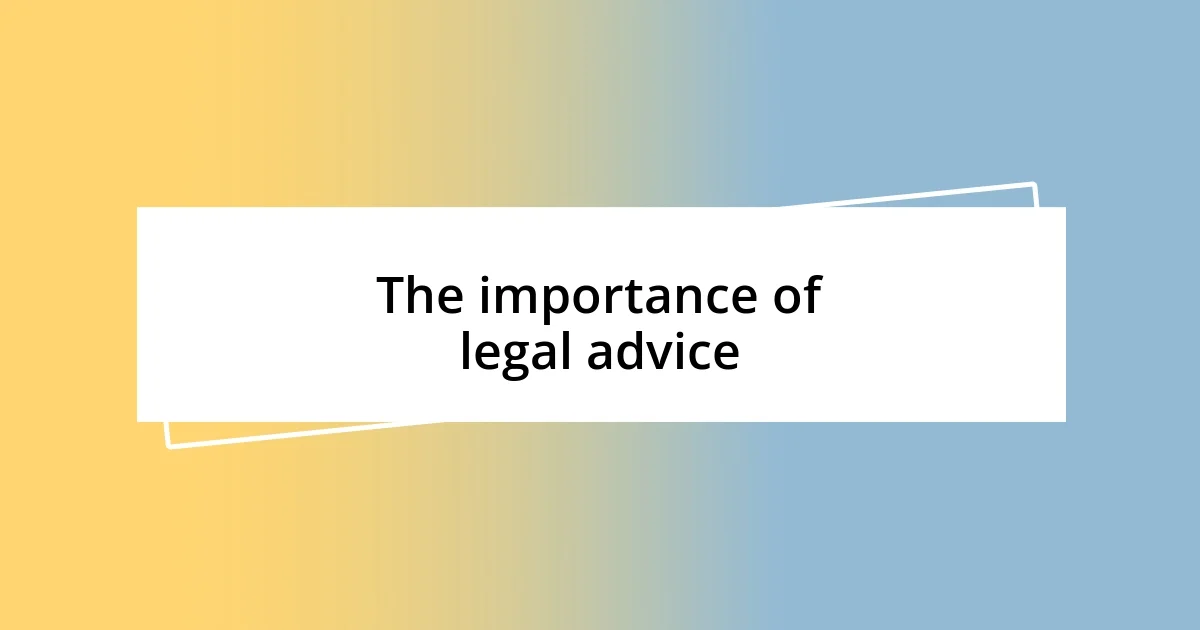
The importance of legal advice
When it comes to author contracts, seeking legal advice is non-negotiable. I remember a time when I thought I could handle my first contract on my own, feeling confident that I could interpret the clauses. However, after consulting a legal expert, I learned how many crucial details I had missed, like future royalties and reversion rights. Have you ever thought you knew it all, only to realize you were just scratching the surface?
The nuances in contracts can be overwhelming, and that’s where a lawyer’s expertise really shines. They can spot potential issues that an author might overlook, such as non-compete clauses or unusual termination rights. I once had a friend who skipped the legal review process and ended up tied to a publisher for far longer than intended, struggling to regain her rights. Wouldn’t it feel comforting to know that someone well-versed in these complexities is looking out for your best interests?
Finally, having legal advice isn’t just about avoiding pitfalls; it’s about empowerment. Understanding your contract with the help of a professional can bring a sense of clarity and confidence. When I finally grasped the implications of certain terms with my lawyer’s guidance, it felt like I had gained control over my writing career. Isn’t it invigorating to think that knowledge can lead to better opportunities and stronger negotiations?
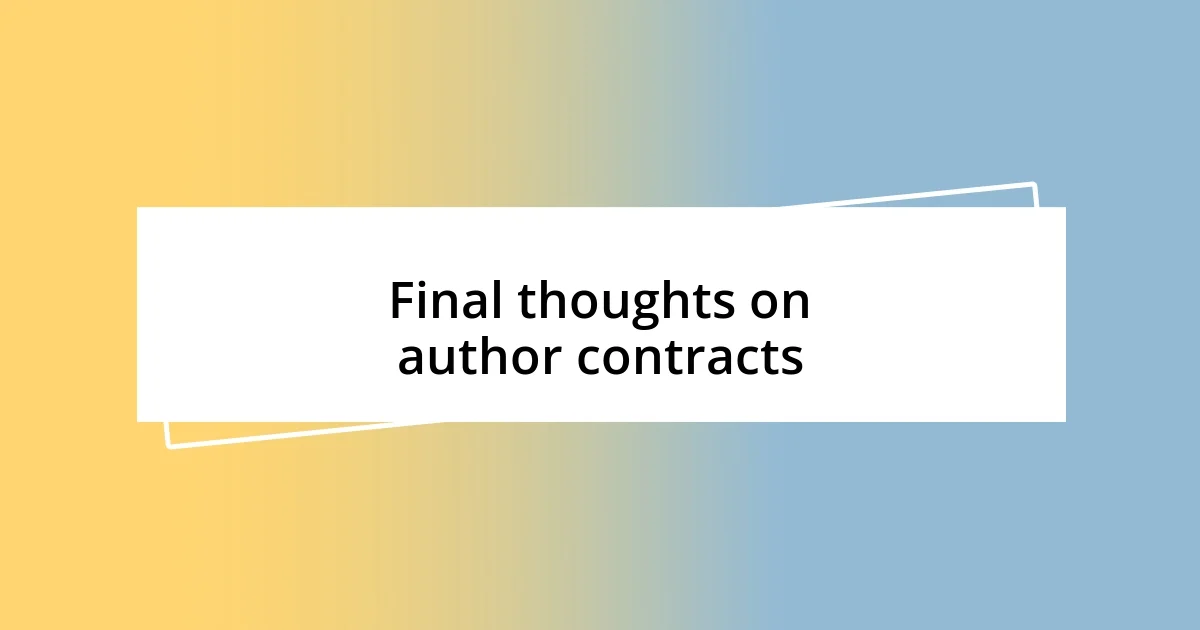
Final thoughts on author contracts
Navigating the world of author contracts can be daunting, yet it’s incredibly rewarding when approached with the right mindset. I remember sitting at my kitchen table late at night, combing through my contract, feeling both excitement and dread. That tension came from knowing how much was at stake in my career. Have you ever felt that thrill mixed with fear while reviewing your own agreements? It can be a heavy burden, but it also fosters growth and learning.
In my experience, understanding the long-term implications of contract clauses, such as rights reversion or territory restrictions, is vital. I stumbled upon this lesson when I unwittingly signed away international rights to my first novel, imagining it would be my big break. Looking back, I wish I’d taken a moment to fully grasp what that meant. Wouldn’t you agree that knowing how these seemingly small details can influence your career direction makes all the difference?
Ultimately, author contracts are more than just formalities; they represent your creative journey and values. Each signed document is a commitment to your work, your audience, and yourself as an artist. When I finally felt empowered to advocate for my interests, it transformed my perspective on the publishing process. How can you take that first step toward empowered decision-making? It starts by viewing each contract as a partnership rather than a transaction, emphasizing mutual benefit for all involved.

